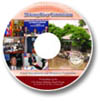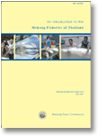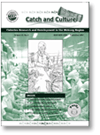Mekong News - Archive
October - December 2007
Issue 2007/4
In this issue:
- Nile Basin Initiative shares MRC experience
- It’s full speed ahead for the Basin Development Plan
- Study reveals true fish consumption in LMB
- Finland backs MRC hydropower, capacity building work
- Denmark supports implementation of review recommendations
- Helping hand for tomorrow’s leaders
- Project highlights uses of paddy fields
- Information Products
- Upcoming events
Nile Basin Initiative shares MRC experience
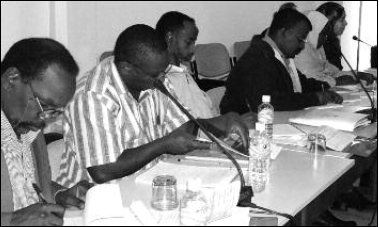
NBI delegates were keen to take note
of the experiences of the MRC
programmes.
In October 2007 the Mekong River Commission Secretariat hosted a sixday study tour by 26 members of the Nile Basin Initiative, representing nine African nations.
The delegates from Burundi, the Democratic Republic of Congo, Egypt, Kenya, Rwanda, Sudan, Tanzania and Uganda came from the Water Resources Planning and Management Project (WRPM), which aims to enhance technical and analytical capacity in the region to support the development, management and protection of the Nile Basin water resources. The WRPM is one of eight projects under the NBI’s Shared Vision Programme.
The project has three technical components: water policy good practice guides and support; project planning and management good practice guides and support; and a decision support system (DSS). The Nile Basin DSS is the core component of the WRPM project. Its objective is to provide a common, basin-wide platform for communication, information management, and analysis of the Nile basin water resources.
It will also provide a framework for sharing knowledge, understanding river system behaviour, evaluating alternative development and management schemes, and supporting informed decision making from a regional perspective.
As the DSS is in its early stages of implementation in the Nile Basin, and the MRC has already good experience of such systems through its own Decision Support Framework (DSF), the delegates were especially interested in learning how MRC goes about achieving basinwide communication, information management and analysis of river basin resources.
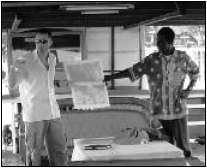
The boat trip took the group to see
navigation aids on the Mekong.
This type of south-south river basin organisation exchange provides an important avenue for cooperation between international river basin organisations and it something the MRC is keen to foster in the future. Many lessons can be learned from others’ experience and this, in turn, benefits the nations involved.
As the MRC is longest-established RBO in the developing world it has accumulated a rich database of research and technical data on water resources management, which can be shared with, or replicated by, younger organisations such as the NBI.
In an intensive two days of presentations and demonstrations from the MRC programme staff, the NBI delegation had the opportunity to learn more about how the programme work is implemented in a basinwide framework. They, in turn, presented their work in the Nile Basin to interested MRCS and National Mekong Committee participants.
The NBI visitors took particular note of the operation of the MRC's DSF modelling system, which is being used to estimate the costs and benefits of various development scenarios within the Mekong Basin which have transboundary implications.
The delegates were able to draw key lessons from the development and applications in the DSF which they hope will improve the NBI’s DSS.
The group spent three days in Vientiane then travelled to Phnom Penh where they took a boat trip to the confluence of the Mekong and Bassac Rivers and saw, first hand, the MRC's latest successful navigation project, the installation of navigation buoys and beacons on the stretch of the river from Phnom Penh to the Viet Nam border.
Following this, they spent a day at the MRC's Regional Flood Management and Mitigation Centre where they learned about the flood forecasting systems in use in the basin and the implementation of flood preparednes and early warning a systems.
The NBI and the MRC share similar goals. NBI member countries have a shared vision, to “achieve sustainable socioeconomic development through the equitable utilisation of, and benefit from, the common Nile Basin water resources”.
It’s full speed ahead for the Basin Development Plan
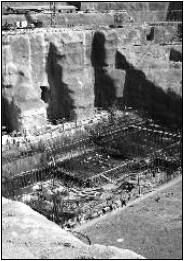
All ongoing water development
projects will be brought into the
planning process.
After a necessary period of reassessing progress from its first phase, and meeting new staffing needs, the Basin Development Plan is now well equipped to forge ahead.
The recruitment of the new regional BDP team is almost complete and national BDP teams have also been mobilised. The inception report for the second phase of the programme has been prepared and discussed with other MRC programmes and in national consultation meetings.
Before the inception report is finalised, it will be discussed in a regional meeting with important stakeholders such as representatives from NGOs, academia, and the private sector, and placed in the broader development context of the region.
The BDP Phase 2 is designed to institutionalise the participatory planning process established during BDP Phase 1, and further develop the assessment tools and planning capacity to produce a IWRM-based Basin Development Plan.
The illustration (on page 2) shows that the Plan comprises three elements that will be prepared with support from the National Mekong Committees, national Line Agencies, and other MRC Programmes. Given the people's high reliance on the river's natural system, the planning process requires a strong partnership of the basin's stakeholders, which can effectively link water resources development on the one hand, and the conservation of the basin's rich riverine ecology and its huge fresh water fishery on the other. The three Plan elements can be summarised as follows:
Development Scenarios which assess the potential for further development of some of the water resources in the different parts of the Mekong Basin. The results will guide the formulation of the Basin IWRM Strategy and the Project Portfolio.
A Basin IWRM Strategy, which guides the planning process at the basin, national and sub-basin levels. It also provides a long-term view of how the Mekong Basin may be developed and a framework within which the Project Portfolio will be designed and implemented. The strategy will build on the existing directions for IWRM in the Lower Mekong Basin.
A Project Portfolio of water and related resources development projects and supporting non-structural projects that would continue to develop some of the Basin's land and water resources, as envisioned in the 1995 Agreement.
The IWRM based Basin Development Plan will employ some existing and proven tools, and others to be improved, that will ensure the Plan achieves benefits for all member countries, and the projects comply with sound environmental and socioeconomic principles.
All ongoing, planned and identified significant water resources development projects will be brought into the planning process. This will offer a platform for MRC to engage in transboundary assessment, based on IWRM, and help prevent potential transboundary disputes caused by water resources development projects.
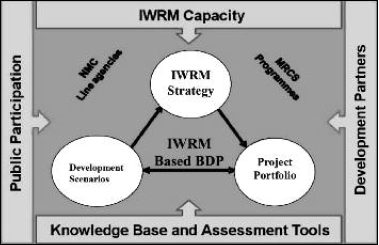
The Plan comprises three elements
that will be prepared with support
from the NMCs, Line Agencies and other MRC Programmes.
Also the major hydropower developments on the Lancang in China will be brought into the planning process, since these may cause a larger impact on the flow regime of the Mekong River than the planned projects in the four countries that share the Lower Mekong Basin. The Plan will be implemented by the countries and their development partners. MRC's contribution to the preparation and implementation of the structural projects includes: reviewing terms of references, feasibility studies and environmental impact assessments; supporting transboundary impact assessment and monitoring; and facilitating project preparation and implementation. Such assistance will further strengthen MRC's role in transboundary governance as well as ensuring that potential issues are mitigated where possible.
It is envisioned that many nonstructural projects in the plan will be implemented by MRC, within the existing programme frameworks, including technical assistance to the implementation of complementary IWRM planning frameworks at regional, national and sub-basin levels.
During the planning process, identified gaps in the knowledge base will be addressed and a comprehensive planning atlas and an updated state-of-basin report will be prepared. The planning process will be supported by IWRM planning courses and workshops delivered by MRC's Integrated Capacity Building Programme and selected institutions in the basin countries.
Training topics include the formulation and evaluation of development scenarios, the use of MRC's modelling and assessment tools and processes, the integration and harmonisation of planning across sectors and areal jurisdictions, and dispute and trade-off facilitation.
Study reveals true fish consumption in LMB
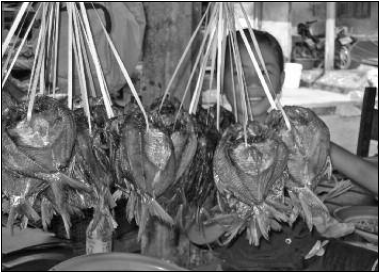
About one third of fish caught in
the LMB is eaten in a preserved or
dried form.
The people of the Mekong Basin eat more than 2.6 million tonnes of fish and other aquatic animals (OAAs) each year, according to a new fish consumption study conducted by the MRC's Fisheries Programme.
This figure represents approximately 2% of the world's capture fishery.
The Lower Mekong River Basin (LMB) fishery has been the subject of at least 20 studies on fish consumption that have been sponsored and implemented by various organisations. Unfortunately, most of the results of the studies are not generally available or synthesised, so views on the size and value of the basin's fisheries vary widely.
The ‘Consumption and Yield of Fish and Other Aquatic Animals from the Lower Mekong Basin’ study attempts to estimate the yield (production) of the fishery based on data on consumption from 20 field surveys in the LMB, with some supporting analyses of complementary data.
These data come from many agencies, but MRC data is also included.
The study uses figures from the year 2000 when the basin had a population of 56 million and takes as its basis fresh whole animal equivalents.
Some of the study's key findings are as follows:
- About one-fifth of the total consumption comprises OAAs, such as snails, frogs and snakes
- About one-third of the fish is eaten preserved.
- Thailand and Viet Nam consume the most, about one-third of the total each. Cambodia consumes about onequarter, and Lao PDR less than one-tenth.
- Per capita consumption of inland fish and OAAs averages 34 kg/year as actual consumption. Cambodia and Viet Nam have above-average per capita consumption, while in Lao PDR and Thailand per capita consumption is below average.
- Inland fish and OAAs provide 47 - 80% (country range) of animal protein with an average intake of 18.3 g/capita/day of a total animal protein intake of 32.5 g/capita/day, a high intake compared with the recommended daily allowance.
- Wetland areas are a vital source of fish and OAAs, particularly in Cambodia
- Even when they are living overseas, people originally from the basin eat higher amounts of fish and seafood than non-Asians.
The study also shows that Cambodia is a nett exporter to the other countries, as it has a large area of productive wetlands, intensive fisheries and moderate population. The yield estimate indicates an enormous fishery which is vital in terms of nutrition, livelihoods, food security and culture.
Various data show that most of the basin's inhabitants fish at some time and that, despite significant investments in aquaculture, about 90% of consumption is derived from the wild capture fishery, justifying an increased allocation of resources to its conservation and management.
These estimates are based on extrapolations of 2000 figures. Obviously actual yields will vary from year to year, and will alter as populations increase.
The study concludes that a regular basin-wide consumption survey, supported by national statistics and fisheries agencies, would greatly assist in reconciling conflicting yield estimates and in institutionalising methodologies and results for basinwide fish yield estimates.
The Fisheries Programme points out that the study does not take into account the dramatic increase in aquaculture production in Viet Nam, which will be the subject of a new report at the end of 2007.
Finland backs MRC hydropower, capacity building work
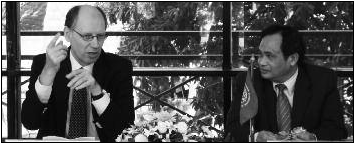
H.E. Lars Backström (left) explains
the importance of the new
agreement.
The Mekong River Commission and the Government of Finland have signed an agreement worth Euro 2 million (around US$2.85 million) to support the development of a hydropower programme (one millionEeuro), Junior Riparian Professional (JRP) project (750,000 Euro) and for the MRC's Water Management Trust Fund (250,000 Euro).
The new funding agreement, which will be spread over four years, was signed by H.E. Lars Backström, Ambassador of Finland to Lao PDR and Mr Do Manh Hung, Officer-in- Charge of the MRC Secretariat in Vientiane on 7 November 2007.
This agreement will enable the MRC to start up its hydropower programme and fund a second phase of the JRP project, as well as supporting the Water Management Trust Fund.
The JRP project is part of the MRC's Integrated Capacity Building Programme and this second phase will see 40 bright young riparian professionals given the opportunity to work, train and learn at the MRC over a period of four years.
The MRC has been planning to commence a hydropower programme for some time. The objective of MRC's involvement in hydropower development is to promote efficient and socio-economically and environmentally appropriate development of hydropower in the MRC member countries in a cooperative and coordinated way.
It will focus on the strengthening of basin-wide cooperation between line agencies in the energy sector The Water Management Trust Fund is a flexible fund which was established by the MRC so it can respond to short term needs of its member countries which its programmes cannot meet. These include strategic policy studies and consultancies, study visits and consultation processes on transboundary issues, and programme development needs such as review workshops and evaluations.
Mr Hung thanked the Finnish Government for its continued generous support for the work of the MRC, noting it already supported the Information and Knowledge Management Programme. “We are particularly grateful for Finland's support in the areas of capacity building and hydropower development, which are two of the areas intrinsically tied to sustainable development in the basin,” he said.
Denmark supports implementation of review recommendations
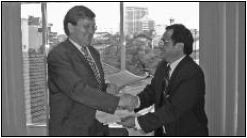
Ambassador Hansen and Mr Do Manh Hung
in Viet Nam.
The Government of the Kingdom of Denmark has signed an agreement worth 3 million Danish Kroner (approximately US$535,000) to support the implementation of the recommendations of an independent review into the MRC and the National Mekong Committees (NMCs), undertaken last year, and to increase capacity building activities in the MRC Secretariat.
The new funding agreement was signed by H.E. Mr Peter Lysholt Hansen, Ambassador of Denmark to Viet Nam and Officer in Charge of the MRC Secretariat, Mr Do Manh Hung at the Danish Embassy in Hanoi, Viet Nam.
The funding provides for the relevant recommendations of the Independent Organisational, Financial and Institutional Review of the MRC Secretariat and the NMCs relating to capacity building activities (including in support of capacity building for Integrated Water Resources Management at the MRC Secretariat and NMCs) to facilitate and support, among other areas, the implementation of riparianisation of the MRC.
As well as strengthening the MRC management capacity, funds will be used to specify common guidelines, roles and responsibilities of the MRCS, NMCs and MRC; and to provide an in-depth analysis of long-term core functions and staff policies of the MRCS.
The funding will also provide support, in the form of expert or consultancy assistance, to the working processes being carried out by various task forces involved in the implementation of the recommendations, to allow them to carry out more in-depth analysis as needed.
Helping hand for tomorrow’s leaders
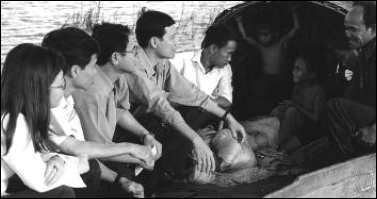
JRPs on the first scheme get hands-on
experience during a study
tour of the Mekong.
Young riparian professionals working in Integrated Water Resources Management (IWRM) in the Mekong Basin will soon have an opportunity to gain training and hands-on experience through a new MRC training programme which will commence in early 2008.
The second phase of the successful Junior Riparian Professional project will enable 40 promising young professionals from water resource related sectors to work with the MRC. During this time they will learn more about international cooperation, regional investment, programme development and management in water resources related sectors and how to use sophisticated IWRM software tools, such as the MRC’s Decision Support Framework.
MRC anticipates this four year programme will bolster the application of IWRM skills and knowledge by young riparian professionals and will also improve the IWRM curriculum used by training institutions in the MRC member countries.
The target groups of participants for this second phase have been expanded to include three categories: Technical: those working in water related areas; International Relations: those working in administration and coordination; and, Academic: young lecturers from universities and training institutes situated in the Lower Mekong Basin.
Exposing these young lecturers to Mekong cooperation through practical experience will strengthen academic institutions. Also IWRM-related training modules, developed out of this project, could be replicated at provincial levels.
Phase two of the JRP project will take gender mainstreaming in water resources development policy and strategy into consideration and it will improve its gender balance by providing support mechanisms for women participants with children.
The project aims to have at least 35% of the JRP intake being female. The JRP training project will be conducted using competency-based modules consisting of three progressive stages:
a) “Learn to do”: training on IWRM concepts, techniques and
tools;
b) “Do to learn”: the trainees are required to apply what they
learn to their work assignment with proper coaching from assigned
advisors; and
c) “Share to learn”: junior professionals will return to their
organisations and share their experience with their colleagues
and apply the acquired skills.
A support mechanism will facilitate the transfer of the JRPs back into their organisations and encourage them to apply their IWRM knowledge and skills in their work.
Project highlights uses of paddy fields
The Agriculture, Irrigation and Forestry Programme held its fourth and final regional workshop on the Demonstration of Multi-functionality of Paddy Fields (DMPF) project at the MRC Secretariat on 24 August 2007.
The project, which was funded by the Government of Japan, had two main activities: to collect data and establish a DMPF database and to analyse the multiple roles of paddy fields.
The workshop summarised the activities of the six-year long project and presented the results of analysis work on several specific paddy fields' functions.
It is hoped this evaluation will provide people with better understanding of the varied roles performed by paddy fields.
Included in the research work were projects on flood mitigation in nurturing aquatic eco-systems, soil conservation and socio-economic issues in northeast Thailand and the Mekong Delta in Viet Nam.
Around 30 participants from the four Member States and resource persons had active discussion on the analysed functions and importance of those functions and the paddy fields themselves. They also discussed methods to disseminate project outputs.
The lessons from these projects can now be used in all four countreis to enhance their knowledge of the importance of paddy fields.
The DMPF has completed almost all its planned activities and is now compiling all the information including its outputs into the project completion (final) report. This final report will be made available by the end of 2007.
An electronic version of the workshop proceedings is now available on the MRC website (www.mrcmekong.org/download/prog rammes/AIFP/DMPF-4thWS-main- R.pdf).
Information Products
Fisheries films in Lao and English
These films about the Lao and Thai fisheries have been produced by national fisheries agencies to reflect the importance of the fisheries in these two countries. The Lao film ‘Fisheries of Lao PDR’ is available in Lao and English.The Thai film River of Life is available in English and Thai. September 2007 $5.00 (Plus postage) |
Proceedings of the 5thAnnual Mekong Flood Forum
This CD-ROM contains the proceedings of the 5th Annual Mekong Flood Forum Flood Forum, ‘Improving Inputs Towards Medium Term Flood Forecasting and Warning in the Mekong Basin’, held in Ho Chi Minh City, Viet Nam on 17-18 May 2007, including text of presentations and photographs. July 2007.US$3.00 (plus postage) |
|
An Introduction to the Mekong Fisheries of Thailand Development Series No 5
This report on the fisheries of Thailand is designed for the nontechnical reader and features a description of the Thai fishery and its importance to people at all levels of society in Thailand. It features many colour photos and illustrations.The report is available in English and Thai. September 2007US$10.00 (plus postage) |
Catch & Culture Issue 2/2007
This issue of Catch and Culture features a selection of articles on fisheries research into selective breeding, transboundary catfish migration and the Mekong flood regime. It also discusses catfish aquaculture and the huge fish processing facilities in the Vietnamese Delta region. Free (postage applies) |
|
| How to order | Contact | |
| All products can be ordered from the MRC Secretariat’s Documentation Centre. Postage costs apply. Mekong region government agencies may write to the MRC to obtain free copies. Check the MRC website for a full list of products. Credit card sales are also available through the website, www.mrcmekong.org/publications/. All products are also available as free downloads from the MRC website. | Documentation Centre Mekong River Commission Secretariat
P.O. Box 6101, 184 Fa Ngoum Road, Unit 18, Ban Sithane Neua,
Sikhottabong District, Vientiane 01000, Lao PDR Phone: (856 21) 263 263 ext: 1122 Fax: (856 21) 263 264 Email: doc.centre[at]mrcmekong.org (replace [at] with @) Website: www.mrcmekong.org |
1st Asia Pacific Water Summit
3-4 December, Beppu, Japan
www.apwf.org
5th International Symposium on Environmental
Hydraulics (ISEH V)
4-7 December 2007, Tempe, Arizona, United States
www.iahr.net/iseh/home/index
ASIA 2008: 2nd International Symposium
on Water Resources and Renewable Energy Development in Asia
10-11 March 2008, Danang, Viet Nam,
mf@hydropower-dams.com
www.hydropower-dams.com
ECWATECH: international congress "Water:
ecology and technology"
3 to 6 June 2008, Moscow, Russia
http://www.ecwatech.com/
Expo Zaragoza 2008 'Water and Sustainable
Development'
14 June - 14 September 2008, Zaragoza, Spain
www.unesco.org/water/water_events/Detailed/1422.shtml
Fourth International Symposium on GIS/Spatial
analyses in Fishery and Aquatic Sciences
25-29 August 2008,.Rio de Janeiro, Brazil,
Call for papers: http://www.esl.co.jp/Sympo/index.htm
13th World Water Congress
1-4 September 2008, Montpellier, France
www.unesco.org/water/water_events/Detailed/1406.shtml
Interdisciplinary Solutions to Instream
Flow Problems
7-9 October 2008, San Antonio, Texas,
www.instreamflowcouncil.org
Choose a newsletter:



